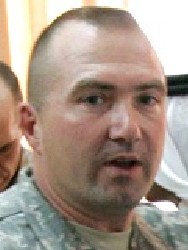Lieutenant Colonel McLaughlin began his military career as an ROTC cadet and was commissioned a second lieutenant in May 1982 at Clarion University. . He was federalized for combat duty in Iraq from the Pennsylvania National Guard.

–
Cemetery:
Awards Received
-

Silver Star
-
Silver Star
Service:
United States ArmyRank:
Lieutenant Colonel (Field Artillery)Regiment:
2d Brigade Combat TeamDivision:
28th Infantry DivisionAction Date:
December 4, 2005 – January 5, 2006
The President of the United States of America, authorized by Act of Congress July 9, 1918 (amended by an act of July 25, 1963), takes pride in presenting the Silver Star (Posthumously) to Lieutenant Colonel (Field Artillery) Michael Erich McLaughlin, United States Army, for conspicuous gallantry and intrepidity in action while serving as the Brigade Effects Coordinator, 2d Brigade Combat Team, 28th Infantry Division (Mechanized), Camp Ar Ramadi, Iraq, from 4 December 2005 to 5 January 2006, in action against enemy forces during Operation IRAQI FREEDOM, at Ar Ramadi, Iraq. Lieutenant Colonel McLaughlin’s gallant leadership, personal bravery and selfless actions are in keeping with the highest traditions of the military service and reflect great credit upon himself, the 28th Infantry Division, and the United States Army.
NARRATIVE TO ACCOMPANY AWARD:
Lieutenant Colonel Michael E. McLaughlin, distinguished himself by exceptionally meritorious conduct in the performance of outstanding service to the United States as the Brigade Effects Coordinator, 2d Brigade Combat Team, 28th Infantry Division (Mechanized), Camp Ar Ramadi, Iraq, from 4 December 2005 to 5 January 2006. Lieutenant Colonel McLaughlin demonstrated outstanding professional skill, knowledge and leadership both prior to and during the Iraqi Police recruiting events during the week of 2 January 2006. As the Brigade Effects Coordinator, Lieutenant Colonel McLaughlin was instrumental in conducting key leader engagements. He personally met on numerous occasions with the Sheiks and the Governor of Al Anbar province in order to foster the participation of the local populace in economic and political progress, and further the transition of Al Anbar province into a unified Iraqi nation. As a result, he was a major contributing factor to the overwhelming turnout of Iraqi Police (IP) recruits at the “Glass Factory” in western Ar Ramadi during the 2 to 5 January 2006 IP recruiting drive. During this period, 750 recruits were screened, in comparison to “0” at the previous event. Lieutenant Colonel McLaughlin was not content with orchestrating and planning behind the scenes, but was an officer that led from the front. On 5 January 2006 he was personally present with his team at the Glass Factory in order to interact with the potential recruits and ensure that the Brigade Information Operations themes and messages were personally delivered to the IP recruits. Lieutenant Colonel McLaughlin arrived at the scene at approximately 0800 on 5 January, and immediately assessed the situation and the unusually high number of IP recruits. At great personal risk and courage, he team commingled in a crowd of over 300 civilian recruits, in spite of known intelligence reports indicating the possibility of both grenade and SVBIED attacks. He immediately took charge of the situation, instructing his Soldiers to be on the lookout for civilians capable of concealing weapons or explosive devices. Through his interpreter, he orchestrated with his charismatic leadership and organizational abilities the abnormally large crowd into a semblance of order. He further directed Iraqi Security Forces to treat the IP recruits with dignity and respect, in order to instill a semblance of unity and purpose among the Iraqi people in the immediate area. Subsequently, a suicide bomber infiltrated the crowd and detonated an explosive device, killing and wounding numerous Iraqi civilians, and ISF/CF Soldiers. At this time, Lieutenant Colonel McLaughlin was struck in the head by shrapnel. One of his Soldiers, Specialist Gibson, himself wounded in the shoulder by shrapnel, immediately checked Lieutenant Colonel McLaughlin for wounds, who in turn, in an act of extreme selflessness, stated that he was okay, but to concentrate on saving the lives of his men. Lieutenant Colonel McLaughlin succumbed shortly thereafter to his wounds. Throughout the period, Lieutenant Colonel McLaughlin displayed extreme personal courage, selfless service and dedication to duty. He was a charismatic leader that always led from the front, and was the consummate professional, fully committed in word and deed to empowering the Iraqi people to pursue political and economic progress and to end the insurgency in the Al Anbar Province. His actions are in keeping with the finest traditions of military service and reflect distinct credit upon himself, this Command, and the United States Army.

